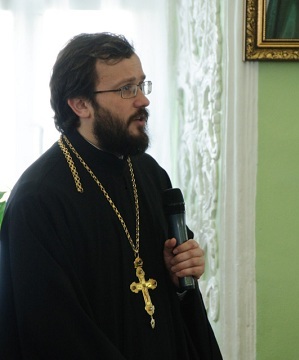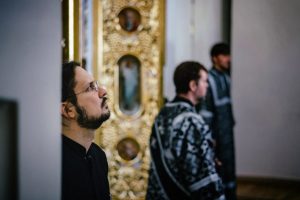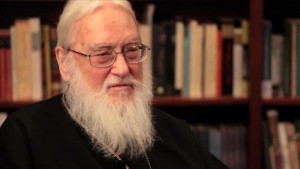Ethics as a closed and self-sufficient system
 Merriam-Webster’s dictionary defines ‘ethics’ as the ‘discipline dealing with what is good and bad and with moral duty and obligation’. Another definition given by the same dictionary presents ethics as a set of moral principles. In other words, it is a systematized view of the nature of ethical norms as well as a codification of these norms. This as well as other definitions of ethics present it as a closed and self-sufficient system of views which can exist outside both religious and philosophical discourse.
Merriam-Webster’s dictionary defines ‘ethics’ as the ‘discipline dealing with what is good and bad and with moral duty and obligation’. Another definition given by the same dictionary presents ethics as a set of moral principles. In other words, it is a systematized view of the nature of ethical norms as well as a codification of these norms. This as well as other definitions of ethics present it as a closed and self-sufficient system of views which can exist outside both religious and philosophical discourse.
This view of ethics was formed in the Enlightenment. As Prof. Stanley Houerwas of Dewk University, North Carolina, a renowned specialist in ethics, remarked, ‘Autonomy (i.e. self-liberation) became the great watchword of the Enlightenment. The autonomy of the individual was but a correlate of the autonomy of ethics; that is, both the individual and the ethics that established the moral dignity of the individual were assumed to be free of any historical and religious determination’ [1].
However, the development of ethics including Christian ethics as an independent discipline, however paradoxical it may seem at first glance, became a logical consequence of the Enlightenment or rather a reaction to it. It is Emmanuel Kant who can be rightly called the father of ethics as shaped in the Enlightenment to pre-determine the development of this discipline to this day. He, unlike many other thinkers of the Enlightenment, claimed to be Christian. He saw his Christian duty in the need to defend the provisions of Christian faith in face of those who challenged it. His attempt to build an ethical system was dictated, among other things, by a desire to justify the Christian morality. True, to this end he had to ‘separate’ this same morality from the person of Christ. Christ, in Kant’s view, was no longer a source of morality but rather its most possible embodiment, whereas the source or ‘archetype’ of moral law, according to Kant, lies in human reason. Therefore, a human being, in analyzing the moral law built in his very nature and seeing that this moral law is embodied as much as it is possible in the person of Christ, should come to the conclusion that to be a Christian is something that does not at all contradicts reason but also enables him to develop as a person of high moral standards as reason demands. Actually, Kant’s logic reminds us of Tertullian’s famous maxim that the human soul is by nature Christian [2]. Just as Tertullian, Kant wanted to show the universality of the foundations of Christian faith and morality as invariants in any coordinate system in which they may be viewed, be it a system of Christian or atheistic views.
Kant’s desire to elaborate a unified system of morality was also dictated by his search for ways to overcome the conflict between Catholicism and Protestantism, at least in the area of moral teaching. Since the Reformation, Europe was shaken by continued religious wars between Catholics and Protestants. A Christian ethics separated from doctrine and acceptable for both the Catholics and the Protestants should have become a bridge to unite the two antagonistic groups and help them learn to co-exist in peace. Thus, the need to find a minimal mutual understanding between Catholicism and Protestantism, on one hand, and between Christianity and the Enlightenment, on the other, singled out ethics as a separate independent discipline which was to become an area free from conflicts on religious or philosophical grounds.
The problem of the justification of ethics
However, ethics once removed from its philosophical and religious roots proved to be instable, deprived of the foundations it used to have within faith systems and religious practices. Kant himself could not find anything better than to assert ethical norms as a ‘categorical imperative’ which actually was given the nature of law constituting a particular norm without giving an exhaustive explanation why it was a norm. For this reason, along with de-ontological justification of ethics suggested by Kant, there emerged new theories explaining the nature of ethics and moral laws. One of them, the theory of consequentialism (from the word ‘consequence’) suggests that a particular action become either morally positive or negative depending on its consequences. According to another theory called aretaic from the Greek αρετή meaning ‘virtue’, what makes an action moral is not so much its consequences as its nature as well as the moral qualities of the actor himself. Finally, some thinkers developed a teleological ethics, from the Greek τέλος meaning ‘end’. According to this theory, whether an action is right or wrong is determined by its final goal, which can be, for instance, the formation of man as a moral being with sustainable virtues including Christian ones. Interesting in this respect are the thoughts of Max Weber who believed a person should be guided in his actions by an ‘ethics of the ultimate end’, while acting on the basis of not only reason but also faith [3].
Christian ethics as overcoming ethical self-sufficiency
So, ethical theories underwent a considerable evolution after Kant. Nevertheless, the self-sufficiency he had given them remained their characteristic feature. The Christian ethics was fit in with these theories, turning into an autonomous discipline which lost to a considerable extent its relation to both theology and life of the Church. In this atomized state, Christian ethics is subjected to criticism from some scholars. In this respect, a vivid evidence of it is the attitude of the already mentioned Stanley Houerwas for whom ‘Christian ethics names the compromise that theology made in modernity by which Christian convictions would still have a hearing in contemporary debates so long as they were detached from the Church’s practices [4]. According to the scholar, ‘attempts to distinguish ethics from theology in modernity have distorted the character of Christian convictions and practices’ [5].
Stanley Houerwas has suggested that ethics should be re-united with theology and the practical life of the Church and as a result Christian ethics should go beyond self-sufficiency. Developing this idea by applying it to Orthodox tradition, one can state that moral norms in themselves are not sufficient for attaining the goals of Christian life, which lie in the establishment of man’s profound and sincere relations God, acceptance of God’s grace and sanctification through it. If moral norms become self-sufficient in a person’s life they may turn into a fetish replacing the genuine goals of Christian life. In this case a Christian becomes a Pharisee for whom the observance of ethical prescriptions substitutes the living communion with God and openness to God’s grace. Ethical norms can and must play an auxiliary role helping a person on his way to perfection. They should lead him to the goal of Christian life without replacing these goals.
This view of the nature of ethical norms correlates quite well with the patristic tradition of our Church. One of the first Christian manuscripts to contain some elements of ethical teaching, Didache, already presents ethical norms as a way rather than a goal to be reached by a Christian on his life journey: ‘There are two ways: one of life and one of death’. Ethical norms, like a way, should only lead a person on the path of perfection but not replace perfection itself.
The problem of a common ethical denominator for different religions
Against the background of these reflections, I would like to deal with a question topical today: Is it possible to find a ‘common denominator’ for the ethical systems of various religions as a certain traditionalistic response to the modern challenges brought about by the secularization of society? This form of polemic with secular ethics appears attractive at first glance. Indeed, it is possible to work out a certain common religious code of behaviour and offer it to the secularized society as an alternative to ‘liberal values’. However, this methodology becomes possible only along the line already offered by Kant, i.e., through the autonomization of ethics and its separation from the fullness of religious tradition and the Revelation. In this case, we arrive at a paradox whereby it is possible to oppose religious ethics to secular ethics only if the religious tradition is secularized by isolating the ethical substrate from it. Christianity in this case, being compressed to the size of an ethical system, would lose its unique nature. As American scholar James Gustafson has remarked, ‘The ethics of Christianity are not unique in any way comparable to the uniqueness of the doctrine of the Trinity, Incarnation, Sacraments, and others. Ethics, both theoretical and practical, in the Christian tradition are much more like Jewish ethics and the ethics of the classical Greek and Roman world than the theology of the Christian tradition is like Jewish theology or Greek metaphysics and religion’ [6].
Therefore, attempts to bring the ethical systems of various religions to a common ethical denominator are essentially a way bringing us back to the paradigms of the Enlightenment and leading to a disintegration of the integral Christian tradition, the separation of morality from theology and practice of church life; it is a way towards the isolation and autonomization of an ethical system. Christian theology has already traversed this path and now has to come back to the understanding of ethics as an integral part of Christian tradition inseparable from theology and the practice of church life.
[1] S. Hauerwas, S. Wells. ‘Why Christian ethics was invented’ в The Blackwell companion to Christian ethics, ed. S. Hauerwas and S. Wells, Blackwell, 2004, p. 31.
[2] Tertullian, The Soul’s Testimony
[3] Max Weber. Politics as a Vocation
[4] Blackwell Companion, p. 28
[5] Blackwell Companion, p. 35
[6] J. Gustafson, “Preface: An Appreciative Introduction to H. Richard Niebuhr’s Christ and Culture,” в H. Richard Niebuhr, Christ and Culture. San Francisco: Harper, 2001, xxvii
Source: Bogoslov.RU


















